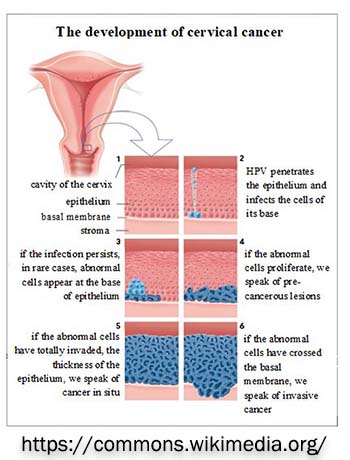Are you aware of Cervical Cancer?
Nowadays cancer is a very common word to us. Most of the people we love die with a cancer or suffer with this disease. Some of us are afraid to hear the word “cancer” even. But if you are aware about the cancer and the symptoms you may be one of the luckiest to defeat it. Today we are going to talk about cervical cancer which is very common among women these days.
What is cervix?
Cervix is a very important part in woman’s body. It is the lower part of the uterus in the female reproductive system. The size of the cervix is 2-3 cm long and it changes during the pregnancy and as you get older. Cervix plays a major role in sending sperms towards a fertile egg during the intercourse. Also, it helps to flow blood out of a women’s body during menstruation.
What is cervical cancer?
Cervical cancer is a situation develops in woman’s cervix. Cervical cancer happens when cells in the cervix are changed by cancer cells. Cervical cancer grows slowly. So, there is much more time to diagnose it before it causes a serious damage to you.
Majority of cervical cancer cases are caused by HPV (Human Papillomavirus) which can be successfully prevented by a vaccine.
Cervical cancer is mostly common among the women who are sexually active.

Risk factors for cervical cancer
- Infection with HPV
- Started having intercourse before the age of 16
- Smoking
- Long-term use of oral contraceptives (Birth control pills)
- Have a STD (Sexually Transmitted Disease)
- Not having a strong immune system
- Having a family history of cervical cancer
Symptoms of cervical cancer
Although there are number of symptoms for cervical cancer, cervical cancer rarely has symptoms in the early stages. Below symptoms can be seen in the latter part of the cancer.
- Abnormal vaginal bleeding: This includes bleeding during or after sex, in between periods, or bleeding when you are through the menopause.
- Pain during the intercourse
- Abnormal vaginal discharge with a strong odor
When the cervical cancer has spread to other parts of the body below symptoms can be seen
- Pelvic pain or lower back pain
- Kidney failure
- Trouble in peeing
- Swollen and painful legs
- Fatigue
- Bone pain
- Weight loss
- Lack of appetite
Get yourself protected…
The key to prevent cervical cancer is to detect cell changes early. Regular check-ups are the best way to protect yourself from this cancer. As mentioned earlier, cancer of the cervix usually takes many years to develop. Hence, you have time to do treatments if it founds early.
The most common method used in Sri Lanka is the “PAP Test” also called as Pap smear test. During this procedure the doctor will take a sample of cells from your cervix by using a swab. Those cells will be then sent to a lab for further review to understand any cell changes that indicate the possible development of cancer. The PAP Test doesn’t hurt, but it feels a little pinch or a bit of pressure. In Sri Lanka if you are more than 35 years of age government facilitates to do this test in “Suwanari Clinics” every 05 years. You can do the same whenever you want in private hospitals too. Noticing cervical cancer early with a Pap smear gives you a greater chance at a cure.
The good news is now you can prevent cervical cancer by getting yourself vaccinated against Human papillomavirus (HPV). It needs to get this vaccine before the first intercourse. HPV vaccination is recommended for preteens aged 11 to 12 years. But it is also recommended for everyone below age of 26. If the vaccination starts before the age of 15 two-dose schedule is recommended. If it starts after 15th birthday it needs to be given a series of three shots. Sri Lankan government has launched this vaccination in school level from 2017. You better contact your area mid-wife or family doctor to get more details about this vaccine.
References:
- https://www.webmd.com/cancer/cervical-cancer/cervical-cancer
- https://www.nhs.uk/conditions/cervical-cancer/
- https://www.cancer.org/cancer/cervical-cancer.html








